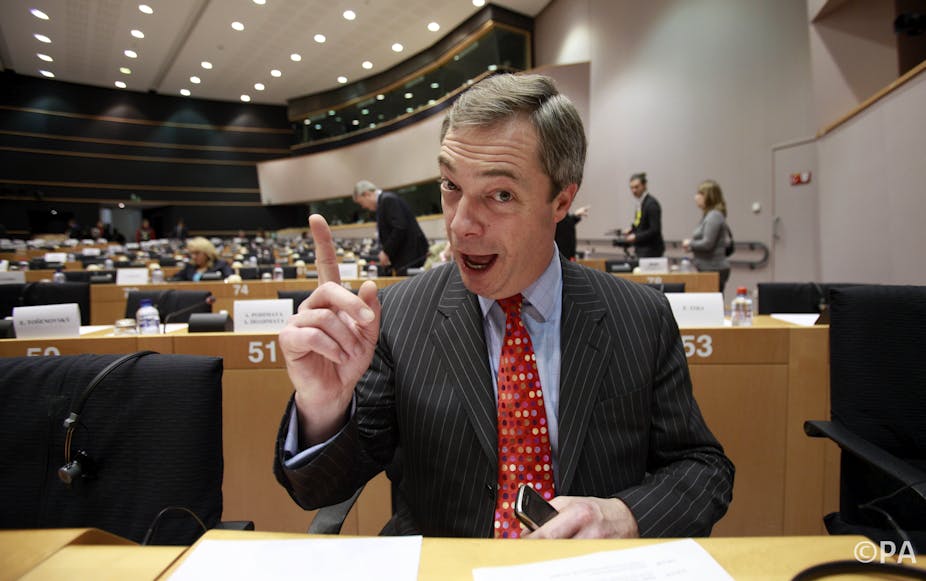The election to the EU Parliament in May looks likely to be nothing short of a car-crash for Britain’s main political parties. The most recent poll by YouGov suggests UKIP is well-placed to poll in second place at the very least, hovering at around the 25% mark in terms of vote share.
Ed Miliband’s recent mini-revival has Labour polling at over 30% – the only party to do so – while both of the parties that govern in Westminster are performing badly; poorly in the case of the Tories, whose vote share is stuck in the low 20s, and downright disastrously in the case of the Lib Dems, who could quite plausibly lose all 12 of their current MEPs.
On the surface, at least, the European election could signal a shifting of the tectonic plates in UK party politics. Will a strong UKIP performance prompt yet more concessions from the Conservatives on a possible “Brexit”? Are the Lib Dems a spent force? Will a strong Labour performance mark another step on the path to Number 10 for Ed Miliband?
But tempting as it is to prophesy profound changes, the political science of EU elections tells us that we should be careful not to draw broader conclusions from what remain “second-order elections”.
Less at stake?
That terminology stems from the work of two German scholars, Karl-Heinz Reif and Hermann Schmitt, who, back in 1980, claimed that we should keep an eye out for three quite specific trends in elections for the European Parliament.
Firstly, given that the composition of national governments was not at stake, voters would simply be less inclined to trek down to the polling station and cast their ballots. Partisans would, as would those who had a particular axe to grind, but a larger than normal number of citizens would be unlikely to bother. This year’s European polls should therefore see low turnouts across the board, just as in previous years.
Secondly, the fact that there appears to be “less at stake” would make many of those who did vote more likely to experiment a little; smaller, niche parties were therefore expected to do much better than they would in elections to national parliaments.
Finally, although the national government would not be changing, the parties that formed it were likely to take a bit of a pounding. If their supporters weren’t playing away from home with smaller parties, they might well be less than fired up by a governmental agenda that perhaps wasn’t delivering all that was originally promised. European Parliament elections generally take place mid-cycle – and by then, a government is often bogged down by the tricky process of governing.
Opposition party supporters, meanwhile, are generally annoyed – and even appalled – by what the government is doing, and are motivated to go out and cast their ballots in a way that government supporters are not.
Much analysis has subsequently been done on the veracity of Reif and Schmitt’s ideas since then and these ideas have subsequently been nuanced and developed in a number of interesting ways. But the main core of what they argued remains valid for a significant number of states across Europe, including the UK.
In terms of voter turn-out the differences between the levels remain large: in the Westminster election of 2001 a mere 59.4% of registered voters went to the polls, the lowest turnout in any UK general election since the second world war. That still compares favourably with the 38.5% who voted in the 2004 European election – the highest recorded turnout in any EP poll in the UK. The 2004 record could conceivably be beaten in 2014 – but we are still very unlikely to see voter participation rival that of even the worst-performing Westminster election. That, as the second point of Reif and Schmitt’s framework indicates, bodes well for the smaller parties, and for UKIP in particular.
UKIP’s moment
UKIP is dominating the protest scene – and quite frankly, if it is not able to do well now, it never will. The Greens may (just) keep one of their seats, but no other small party has been able to get a look in. This will be UKIP’s moment.
It should therefore be no surprise that both the Tories and the Lib Dems receive a drubbing. That particular pattern is anything but uncommon; Labour trailed the Conservatives in the 1999 and 2004 EP elections and the Conservatives performed worse than Labour in 1989. Governing parties might well be on a hiding to nothing in Euro elections, but there is plenty of evidence that, theory at least, they can (often) bounce back before the next UK general election comes around.
The political science of this is therefore clear enough. Euro elections provide a poor indicator of what is likely to happen at the next general election. Both the Conservatives and the Lib Dems will undoubtedly have post-election challenges to face, but the historical record says that these challenges are not per se insurmountable.
Protest parties that strike the right note, as was the case with UKIP in 2004 (16.2%) and 2009 (16.5%), can do very well in second-order polls, but only very infrequently are they able to carry this on to the biggest of big stages.
Messrs Cameron and Clegg will not enjoy May 2014, but if they keep their nerve then all need not be lost. On the contrary, and if history is anything to go by, it’ll be UKIP that faces the biggest challenge –- that of using second-order success to break in to the first-order arena.

